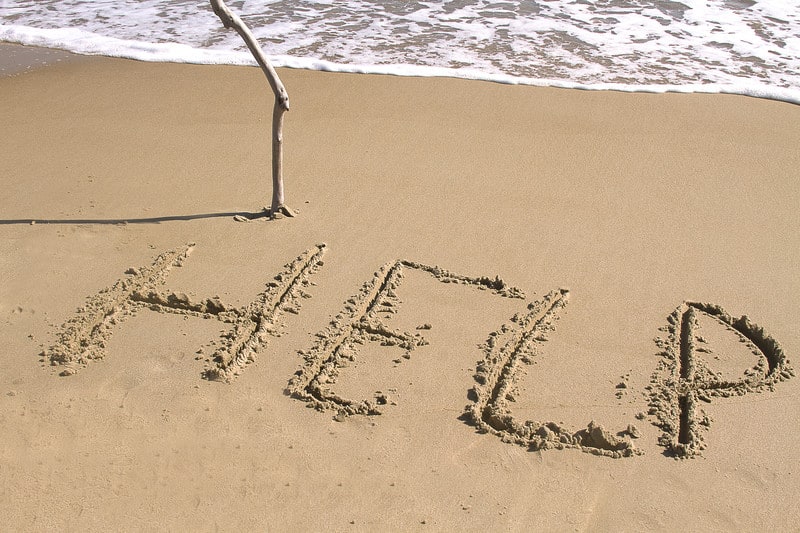Maybe a friend suggests getting counselling or therapy. In the end though, that’s not usually what makes you go. Or not on its own.
Thinking about getting counselling and actually making an appointment are very different things. Weeks, months or years can separate the two.
The final triggers that lead people to see a therapist generally fall into four categories. Of course they may overlap but each is quite distinct.

1. Crisis
Crisis is an obvious catalyst to seek therapy. You may have vaguely thought about it beforehand, especially if a challenging situation has been worsening. But when a crisis hits it is almost as though you now have the necessary excuse to call a counsellor.
Crisis takes many forms. It could be the end of a relationship, loss of a job or health issues. Or, any major life change, loss or conflict. It is often sudden, dramatic or somehow shocking.
Deciding to get help is often becomes easier in these extreme circumstances.
2. Symptoms
It may also be relatively easy to decide to seek counselling when there is a marked onset or sudden escalation of symptoms.
Given my area of specialty, stress and anxiety symptoms are common triggers for people to begin seeing me. You may notice a significant change in how you are functioning or feeling. For example, feeling constantly on edge, unable to sleep or think straight.
A panic or anxiety attack is often what prompts you to take that step to get help from a therapist.
Interestingly, people rarely tell me that ‘depression’ is their reason for coming. More often they mention a symptom related to depression – irritability, angry outbursts or waves of sadness and tears.
3. Feeling Stuck
This is when you experience stress with a sense of paralysis in some area of your life where you need or want to make a change. You might find yourself literally unable to make any movement on a decision. Or somehow unable to do something that needs to be done, like a visa or job application.
It could be a recurring pattern of indecision or lack of motivation – or a sense of going nowhere with respect to relationships. Not knowing what or where to go next in life.
You find that no amount of thinking or talking about it helps. You are stuck with a consuming sense of discontent or agitation – like something needs to happen or change. This is when you are likely to resign yourself to the idea of some therapy.
4. Crunch time
Similar to ‘stuckness’ is another kind of trigger that comes from a need or desire for significant change. It is an event or situation that confronts you and has you thinking that it is crunch time.
There are many different versions. A good friend gets married, has a baby or falls ill – any of these types of events can remind you of time passing and that perhaps you yourself are not where you want to be in life, love, work or health.
Likewise perhaps you are about to, or have just turned 30, 40 or 50. Alternatively, maybe it’s you who’s having a baby, getting married or seeing it’s not long before the kids leave home. A milestone birthday or any close encounter with a major life event can bring a heavy sense of unease – a growing awareness that there’s an aspect of your life that needs attention.
Maybe it’s a movie or book that confronts you with an uncomfortable reality in your life and tells you it’s crunch time. You realise something has to change.
Dissatisfaction creeps into your consciousness or a nagging sense of unmet potential. Things aren’t the way you wish them to be. You may have an idea of why but feel powerless to do anything about it. Equally possible is that you really don’t know how you’ve wound up where you are in life. It is enough of a cue to seek out a therapist.
And when someone does suggest you get some help…
You might not welcome the idea of seeing a therapist. And when someone suggests it to you, all sorts of reactions can come up – anger, doubt, awkwardness, shock. But I think often a part of you is relieved to hear it. Maybe it offers a whiff of hope, something you can try when all else has failed.
However it is that you wind up getting counselling, above all else, you will probably feel relieved.
In my experience relief is the most common outcome of seeing a counsellor for the first time. Not because you are suddenly free of pain or uncertainty but because you are taking action to improve your situation.
Who cares how you get there – no doubt as you progress in counselling or therapy and your situation improves, you’ll feel more comfortable and optimistic about your decision and the changes you’re making. Before too long you’ll be tentatively suggesting to a struggling friend, “ever thought about getting counselling?”
